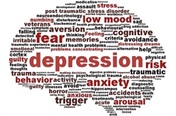
Unfortunately, you cannot change a genetic vulnerability to depression, or a history of loss or trauma. But you can do a lot to decrease the stressors in your life and to keep your brain functioning optimally.
Follow these self-care steps to cut your risk for depression and/or a relapse:
Follow a healthy, balanced diet
Never underestimate the power of a healthy, balanced diet. “Think about it. Your brain is always ‘on’,” writes Dr Eva Selhub on the Harvard Health Blog. “It takes care of your thoughts and movements, your breathing and heartbeat, your senses. It works hard 24/7, even while you’re asleep. This means your brain requires a constant supply of fuel.
“That ‘fuel’ comes from the foods you eat – and what’s in that fuel makes all the difference. Put simply, what you eat directly affects the structure and function of your brain and, ultimately, your mood.”
Aim for high-quality foods that contain lots of vitamins, minerals and antioxidants (i.e. foods that will nourish your brain) and steer clear of refined and processed foods (especially refined sugar). Eat at least five servings of fruit and vegetables every day, and include wholegrains, nuts, seeds, lean proteins, legumes and dairy in your diet.
Also note that there appears to be a link between depression and obesity. If you’re overweight or obese, it’s important to lower your weight. A registered dietitian can assist.
Exercise regularly
Several studies have shown that exercise alone, or in combination with other therapies, is as effective in treating mild to moderate depression as antidepressants and cognitive behavioural therapy (a short-term, goal-oriented type of psychotherapy).
Exercise lifts your mood, boosts your self-confidence and makes you feel better physically. In addition, exercise has been shown to improve cognitive function and sleep quality – two of the most frequently reported symptoms among people with major depressive disorder (MDD).
Choose a type of exercise you enjoy and aim to do at least 150 minutes of moderate-intensity exercise every week.
Get a good night’s rest
Depression may cause sleep problems and sleep problems may cause or contribute to depressive disorders.
“For some people, symptoms of depression occur before the onset of sleep problems. For others, sleep problems appear first,” says the American National Sleep Foundation. Sleep problems and depression may also share risk factors and biological features, and the two conditions may respond to some of the same treatment strategies.
While getting a good night’s rest may not always be possible if you suffer from depression, it’s important to do everything in your power to sleep well.
Follow these steps:
- Don’t read or watch TV in bed if it leaves you feeling overstimulated.
- Avoid using your cell phone in bed.
- Wear comfortable clothing in bed.
- Both caffeine and nicotine can keep you awake, so avoid both before bedtime.
- Go to bed and get up at the same time every day.
- Don’t exercise during the two hours before you go to bed.
- Avoid taking naps during the day, as this could interfere with night-time sleeping.
- Get adequate exposure to bright light during the day.
- Make sure that your bedroom is quiet and warm.
- Do something relaxing before going to bed, e.g. take a warm bath or meditate.
- Make sure that your bedroom isn’t too light at night. Street lights or lights in passageways can make it difficult to sleep. Invest in curtains with a black lining if necessary.
- If you don’t fall asleep within 30 minutes of going to bed, get up and do something else. Tossing and turning can make you associate your bed with frustration.
Avoid alcohol and drugs
Depression is closely linked to the use of alcohol and recreational drugs. These substances all have some kind of effect on one’s mental health, and can affect your mood and behaviour in different ways. Even using moderate amounts of alcohol can be risky if you have a history of mental illness.
If you find it difficult to stop using alcohol and/or drugs, it’s important to seek help.
Make time for relaxing activities
Depression frequently goes hand in hand with tension and anxiety. Explore a few relaxation techniques like yoga, massage, meditation and/or aromatherapy to see if these activities help you to relax.
Also schedule regular holidays and mini breaks, and make time for hobbies and other activities you enjoy.
Reviewed by psychiatrist Dr Matthew Mausling, Life Kingsbury Hospital, Claremont. October 2018.
Read more:




 Publications
Publications
 Partners
Partners
















